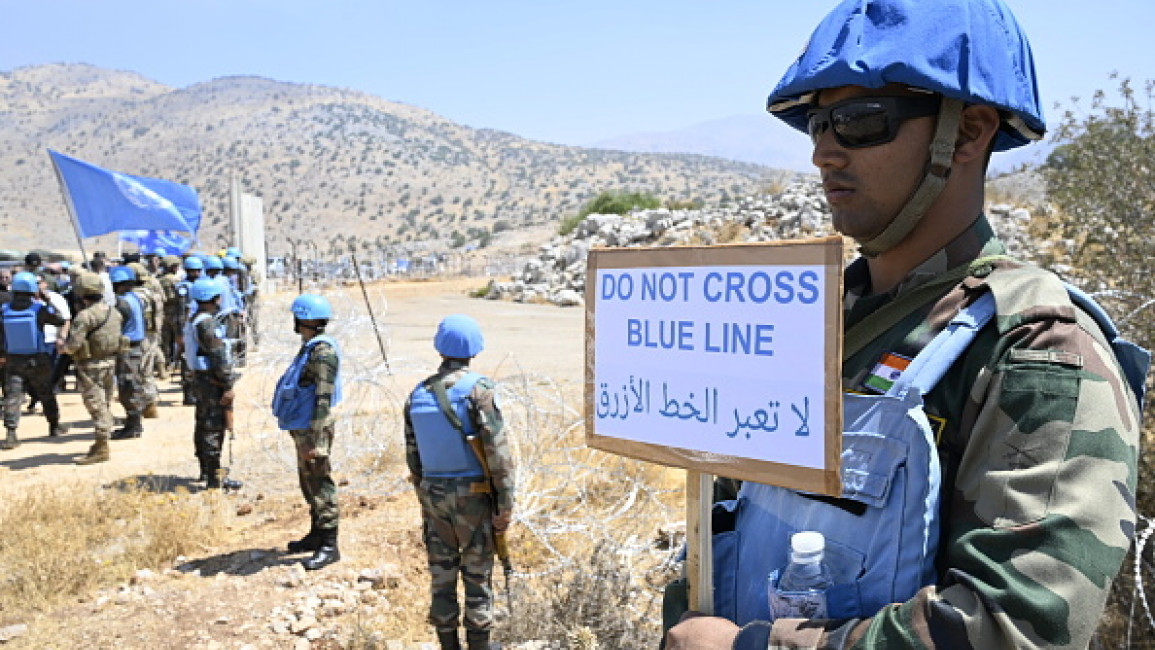UN debates UNIFIL renewal amid rising tension on Lebanese-Israeli border
The UN Security Council (UNSC) is expected to renew the UN Interim Force in Lebanon (UNIFIL) mandate today, 30 August, despite rising tensions along Lebanon's southern border with Israel.
UNIFIL, established in 1978 to confirm Israel's withdrawal after its initial invasion of southern Lebanon and to keep the peace along the border, has to be renewed annually by the UNSC.
Historically a given, the passing of UNIFIL's mandate has in recent years become politicised, as both pro-Iran militia Hezbollah and Israel have tried to reshape the UN force to their liking.
"This year's mandate renewal discussion comes at an especially tense moment for the peacekeeping force," David Wood, the Crisis Group's Senior Analyst for Lebanon, told The New Arab.
In particular, Hezbollah has taken issue with Article 16 of the prior year's renewal, which allows UNIFIL to carry out its mission in southern Lebanon "independently" of the Lebanese Armed Forces (LAF).
On Monday, Hezbollah head Hassan Nasrallah said that "a foreign armed force moving around Lebanon without agreement with the army is an attack on our sovereignty," referring to UNIFIL.
The Lebanese government has echoed Hezbollah's concerns, with Lebanon's Minister of Foreign Affairs emphasising UNIFIL's coordination with the LAF "in a way that preserves Lebanese sovereignty."
Israel, by contrast, has called for a more independent UNIFIL force, pushing it to play a more active role in preventing Hezbollah activity on Lebanon's southern border.
Israel's defence minister, Yoav Gallant, said in a meeting with UN Secretary-General Antonio Guterres on Monday that UNIFIL should be able to "act independently in South Lebanon."
Escalating rhetoric and tensions along the border
In recent years, Hezbollah has escalated its rhetoric against the UN Force, portraying it as an occupying force.
On Monday, Nasrallah accused the UNSC of trying to make "UNIFIL work for Israel, to be a spy in Israel's pay."
This contrasts heavily with Hezbollah's historical relationship with the UN force. In the past, Hezbollah valued the force for its provision of humanitarian aid and its presence's role as a buffer between it and Israel.
However, after the 2006 July war between Hezbollah and Israel, UNIFIL's presence in southern Lebanon was scaled up from about 2,000 troops to a maximum of 15,000 soldiers.
A new renewal of the peacekeeping of the force expanded its powers, including by giving it a maritime force to prevent arms shipments into Lebanon.
Internationally, pressure was applied by Israel and other Western powers to try to broaden UNIFIL's mandate even further to include the disarmament of Hezbollah.
Though that international pressure never translated into UNIFIL being a force aimed at taking away Hezbollah's arms, it nonetheless has caused Hezbollah to bristle at its presence.
"Publicly, Hezbollah has claimed that UNIFIL – if allowed to operate independently of the LAF – would infringe on Lebanon's sovereignty, effectively becoming an occupier instead of a peacekeeping force," Wood said.
While this has proven a good way to rally Hezbollah's base, Hezbollah's insistence on UNIFIL coordinating with the LAF could also serve as a way to bog down the force's movement in the south.
"The requirement that UNIFIL coordinate with the LAF evidently restricts the force's capacity for inspection under its mandate to keep the area free of armed groups," Wood explained.
He pointed to the LAF's staffing and fuel concerns as a way of "hemming in" UNIFIL's movement in the south and, in turn, giving Hezbollah "a freer rein" for its operations.
In private, a source from within UNIFIL told TNA that UNIFIL tries to coordinate its patrols with the LAF "as much as possible."
The source said that it views the presence of the LAF as a way to smooth over tensions with communities in the south and to prevent incidents such as the killing of UNIFIL soldier Sean Rooney in December 2022.
UNIFIL also acts as the only mediator between Israel and Hezbollah, given that Lebanon and Israel have no diplomatic relations.
A series of incidents on Lebanon's southern border, including exchanges of rockets and the alleged infiltration of northern Israel by a Hezbollah operative who set up a roadside bomb, has increased tensions in the area.
"The tensions are high, given Hezbollah's attempts to re-define the rules of engagement and the balance of power," Mohaned Hage Ali, a senior fellow at the Malcolm H. Kerr Carnegie Middle East Center, told TNA.
"Palestinian factions became more active on the southern borders, and the coordination between factions in the Palestinian territories and Hezbollah is now at an advanced stage," Hage Ali explained.
In June, Israel announced that Hezbollah had placed two "military tents" in disputed territory. In turn, Israel built a wall around the town of Ghajar, the northern part of which lies in Lebanese territory.
It was UNIFIL who mediated between the two parties over the issue of the military tents and Ghajar to try to de-escalate the situation.
According to Wood, UNIFIL's role has grown even more critical given the rising tensions.
"In this volatile context, it would be unwise to dilute UNIFIL's mandate. Both Israel and Hezbollah – despite their fiery rhetoric directed against each other – have shown plenty of signs that they do not want war," he added.



